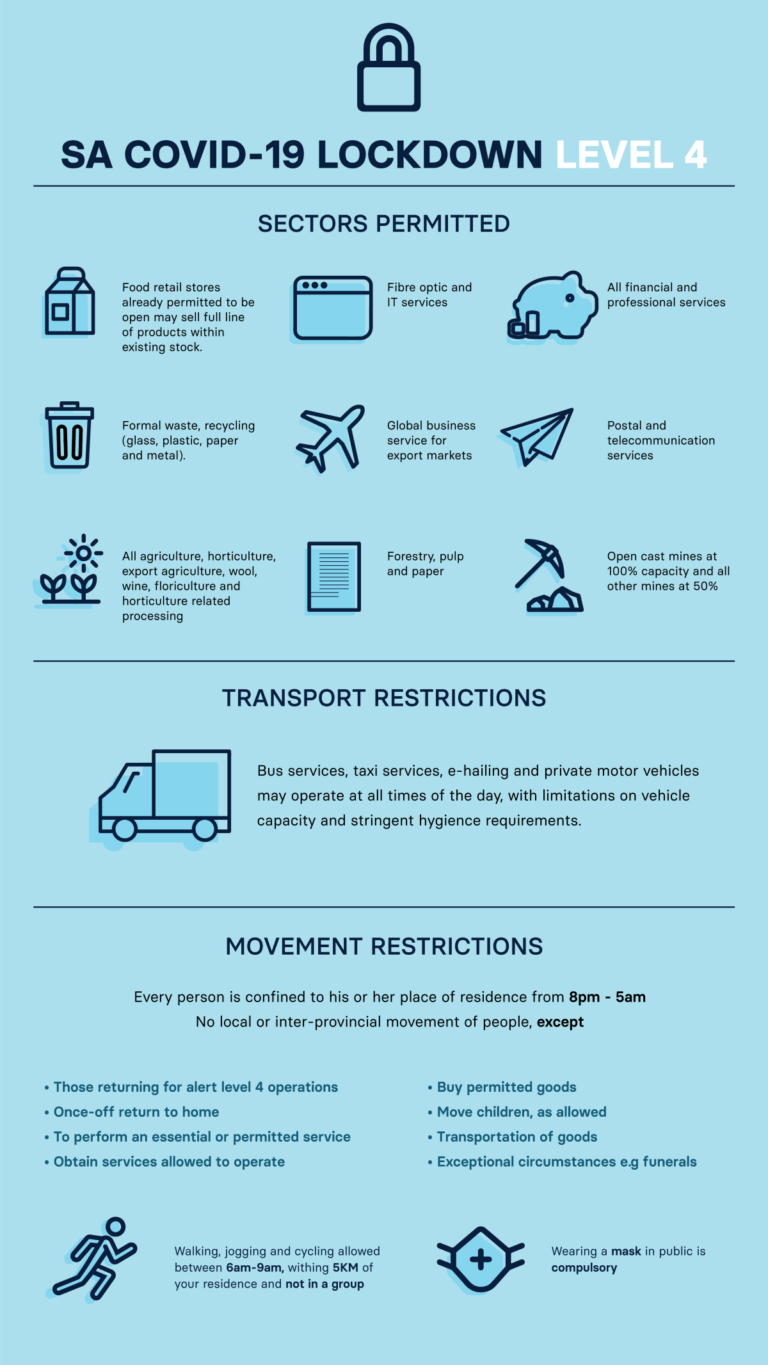Lockdown level 4 regulations updated
As of 14 May 2020, all online shopping is allowed except for the sale of alcohol and cigarettes.
According to new regulations published on Thursday afternoon, e-commerce sites are no longer limited to the small range of items that physical stores may sell – though they (and customers receiving packages) must comply with new requirements to prevent the spread of the coronavirus.
The new directions are immediately in effect. Click here to read further.
Who may trade during Level 4 of the lockdown?

- All Agricultural Operations plus export
- Manufacture of winter clothing, footwear, children’s clothing, bedding and heaters (and everything related to producing them) – start at 25% capacity and scale up slowly to 50%.
- Live-in Staff and Carers – care providers for the sick, mentally ill, elderly, people with disabilities and children (yes, nannies are back!).
- Restaurants may only serve hot food for delivery, between 9am and 7pm.
- The financial and business services sector
- Fibre Optic and IT services – because we’ve never needed fast internet more!
- Recycling and Waste disposal services
- Wholesale and retail trade, physical stores & e-commerce:
Level 5 standards PLUS:
- Hot cooked food only for delivery
- Winter clothing (and components, like textiles)
- Footwear (and components)
- Bedding (and components)
- Heaters (and components))
- Beauty and Personal Care items (including skin, hair, face, and nails)
- Stationery and educational books
- Car Sales (and components for vehicles)
- Personal ICT equipment, including computers, mobiles, and other home office equipment.
- Hardware, components and supplies (not just for essential service anymore)
Level 5 Recap
- Food products, non-alcoholic beverages & animal food
- Hardware only for the purpose of essential maintenance services
- Toilet Paper and feminine hygiene products
- Medical Supplies
- Cleaning Products and chemicals
- Baby and Toddler care products
- Personal and Dental hygiene products
What precautions should be taken?
Follow a readiness checklist.
Risk Analysis: Doing a risk assessment is mandatory for businesses with more than 10 employees (printed and kept on file in case of inspection). For companies with over 500 staff, it must be submitted during the CIPC application process. This means looking at spaces (and the equipment and surfaces in those areas) that are high touch zones on the premises; analysing how people usually move around closely; where and how general hygiene can be amplified.
Social distancing measures: Employers must ensure that all staff and customers remain at least 1.5m apart, with the help of clearly demarcated spacing in all high-traffic areas (using tape or paint). There should be physical screens or barriers installed where adequate distancing is not possible. Hand sanitisers must be supplied at any interaction points, like trolley stations or payment points.
Chemicals: Businesses must enforce good hygiene practices, and must supply soap and sanitizers at hand washing stations, while also making provision for regular disinfecting of each area throughout the day.
Recommended Chemicals:
- For hand sanitizer, at least 70% alcohol based
- For surfaces and equipment: chlorine, hydrogen peroxide or QAC sanitizers.
- Floors and walls: bleach
PPE: Employers are also responsible for supplying and laundering/cleaning/disposing of specifically designed face masks (at least two per person) and disposable gloves, for all employees. If the nature of the job entails greater risk of exposure, the extra necessary gear must also be provided.
Ongoing Monitoring: Businesses with more than 10 staff must have an infrared thermometer in order to check all employees for fever, daily. All operations will need to formulate a procedure for if an employee shows signs of having contracted the disease.
Staff must urgently alert their employers if they have any of the following symptoms:
- Fever
- Dry Cough
- Sore Throat
- Red Eyes
- Headaches
- Shortness of breath
Anyone who shows signs of possible infection, must contact the 24Hr HELPLINE 0860 029 999, and businesses must make provision for a way to safely isolate and remove them, without prejudice or discrimination.
Here is a video on how to monitor yourself.
COVID-19 Workplace Policy: Using insight from doing the above analysis, create a personalised guide for protecting your entire business. It must detail the special measures which will be enforced – using the checklist areas to guide that process.
Companies with more than 10 staff must keep a copy of their plan for inspection, and must have a designated COVID-19 compliance officer. Employees should also complete a travel history report, and health screening before anyone returns to work.
Training: Businesses with more than 10 employees must designate someone to make sure all procedures are being followed (a Compliance Officer). Everyone needs to be informed and vigilant: take time to explain and follow up, make posters and reminders for regular hand washing, sanitizing, and symptoms to watch out for.
Answers to general FAQs can be found here.
Is there paperwork involved?
Yes, but it’s simple to apply – this clip explains how. Companies can apply to register and download their CIPC certificates online. Individuals or sole proprietors must determine for themselves whether they are providing an essential service (under level 4 regulations), and will have to justify their decision in writing – which must be printed out and kept on hand. Business owners may distribute permits to their staff, under the same conditions.
Paper-trail Checklist
Every person moving around for work during Level 4, must have on them:
- Copy of the company’s CIPC certificate (if you work for a registered company)
- Permit issued by owner of company (if you work for a registered company)
- Driver’s licence or ID (everyone)
- Letter from employer or self: stating name of employer (with contact details) and employee (or self), the job performed, and why this activity is allowed, under level 4 regulations. (everyone)
A full copy of the gazette can be found here, including copies of forms that can be printed and filled out.
The above regulations were correct at the time of publishing but are subject to change at any time. If you require further clarification, contact the relevant government department through their websites.



